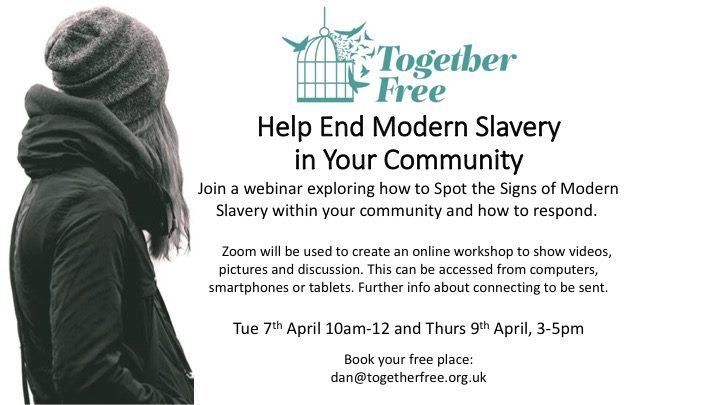'Fatal' impact of coronavirus on Modern Slavery victims
The pandemic highlights the need for improved detection and protection for the most vulnerable and exploited in our communities, writes Dan Pratt
 The UK’s coronavirus pandemic could prove fatal for victims of Modern Slavery in Britain. The pandemic has been noted to add additional dangers to the already volatile lives of the estimated 136,000 people kept in Modern Slavery in the UK. This raises questions regarding how churches and communities can respond?
The UK’s coronavirus pandemic could prove fatal for victims of Modern Slavery in Britain. The pandemic has been noted to add additional dangers to the already volatile lives of the estimated 136,000 people kept in Modern Slavery in the UK. This raises questions regarding how churches and communities can respond?
Thomson Reuters reported that ‘the coronavirus pandemic could prove a double blow for modern slaves in Britain as those showing symptoms are unlikely to stop working or seek help, while other victims may be driven further into debt bondage, academics and activists warned on Tuesday’.
Rebecca Chambers from the charity Antislavery notes that someone trapped in modern slavery who is displaying symptoms of coronavirus may be forced to work through their symptoms. Or for those in slavery who did have the means to access health-care, may choose not to if they were fearful of detention or deportation. These reasons, along with the squalid conditions that people are forced to live in without access to good washing facilities, are noted as being a catalyst for the virus to spread rapidly.
This is evident from recent reports of the modern slavery ring in the Midlands which made 400 victims live in ‘cramped, rat-infested accommodation’. The gang were jailed after making some of its victims work on farms, rubbish recycling centres and poultry factories for as little as 50p a day. The victims were forced to use soup kitchens and food banks to survive.
Chambers writes that for victims of modern slavery, ‘even distancing from others is often impossible as a vulnerable person’s movements and interactions are controlled by someone else. But viruses don’t discriminate, it doesn’t care whether someone is in slavery or not’.
This pandemic highlights the need for improved detection and protection for the most vulnerable and exploited in our communities. It also raises the question regarding how can churches and communities respond during the crisis.
Suggestions include:
-
Those who are key workers during the pandemic be vigilant in being able identify potential victims who may be using services for support or health-care
-
With time at home we have opportunity to observe what is happening on our streets. Are there houses with any suspicious activities, or too many people crowded into them?
-
Together Free’s Safeguarding Guide for Churches and Communities is available to download from www.togetherfree.org.uk/resources
-
Engage in an online 2 hour workshop to know how to Spot the Signs of Modern Slavery and Safeguard. Contact dan@togetherfree.org.uk for more information.
-
Raise awareness about Modern Slavery through your church networks. Explore resources from The Clewer Initiative www.theclewerinitiative.org
-
Join in the following prayer with your church:
Liberating God
For those in captivity in our community, bring release
For the vulnerable being exploited, bring freedom
For those praying for freedom, hear their prayer
For those distressed, fill with your comfort
For those sick, bring your healing
For workers serving, give strength
For services and charities providing, give resources.
For churches, give a renewed calling
For us to join with you in setting the captives free.
Amen.
Dan Pratt is the Eastern Baptist Association Anti-Slavery Co-ordinator who founded and leads Together Free, the Baptist movement seeking to work with local churches to end modern slavery and human trafficking
Baptist Times, 30/03/2020